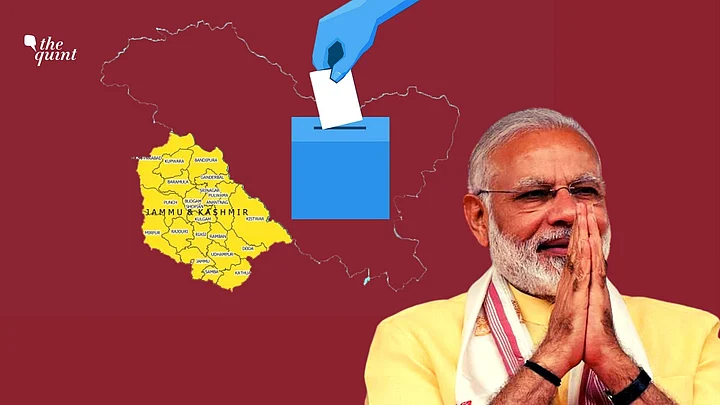1905 was one of the most momentous years in the history of the Indian national movement. It was in this year that the infamous Bengal partition was carried out by the then Viceroy Lord Curzon. Following this, Curzon’s name was etched into the collective memory of the Indian masses as a symbol of division, deceit and disharmony.
The phrase ‘Divide & Rule’ thus entered the vocabulary of the Indian intelligentsia who denounced the move as a clear attempt to draw a wedge between the Hindus and Muslims of India in general, and Bengal in particular. The British, however, did not stop here. The Bengal partition was followed up with many more divisive measures, such as the separate electorates provided under the 1909 Morley-Minto reforms, which was another blatant attempt to eternally segregate and compartmentalise the two communal groups.
August 5 Move Was Part of the Strategy
If the history of great power politics teaches us anything, it is that the divide-and-rule strategy has been the most effective in keeping competing political forces under check. The incumbent is wary of these competing forces uniting under a common banner against it and introduces schisms to keep them fragmented. In British India, the common banner was the sentiment of nationalism and independence. The British were especially anxious about this since the massive 1857 mutiny, in which Hindus and Muslims had presented a common front against them. However, by introducing schisms based on religion, they were successful in keeping the united forces of nationalism at bay for almost a century more to come. The national sentiment of independence was thus reined in by using the personal and cultural sentiment of religion.
The current dispensation seems to have taken a leaf out of the British book, especially when it comes to their Jammu & Kashmir policy. Here, they have used the divide & rule policy to their advantage on many levels. Along with the abrogation of Article 370 on August 5 2019, the erstwhile state was also divided into two separate Union Territories. Communication was severed and local political leaders of any standing were detained. All these measures were taken to avoid the unification of political forces against the step.
They had, after all, taken away the special autonomy that Jammu, Kashmir and Ladakh had collectively enjoyed so far. But the larger pro-autonomy sentiment was cleverly defused using the baser sentiment of regionalism.
Post-August 5, while Kashmir was completely silenced, the right-wing media bizarrely portrayed the people of Jammu and Ladakh “celebrating” – rather than grieving – not just the loss of the special autonomy but also the demotion to the status of a Union Territory. On closer observation, in fact, Jammu being a relatively stable region is most susceptible to outside commercial incursion and cultural dilution. Similarly, Ladakh is economically unviable as an administrative unit and will always have to stand in a long queue when the Centre doles out pocket money to its Union Territories.
BJP's Proxies in Kashmir
On the electoral level, the BJP acknowledges the significance of the Kashmir division and is trying to employ similar measures here as well. By trying to prop up certain proxy figures and parties in the Valley, it seeks to fragment the mandate so as to eventually rule the Union Territory with Jammu as the de facto capital. These figures necessarily have to be Kashmiri-Muslims to ensure their acceptance amongst the masses. This gameplan takes very basic political arithmetic to unravel and has, in fact, already entered the drawing-room conversations of Kashmiri households.
This is not to say that the proxies are making any efforts to conceal their allegiances. On the contrary, some of them are meeting top BJP leaders “privately” and cleverly releasing pictures with them, to impress with their bonhomie and proximity to power. Many of these proxies avoid commenting on grave political questions like Article 370. They conveniently call the matter ‘sub-judice’ and throw the ball into the court of the judiciary, just to toe the line of their patrons and to avoid infuriating them. The right-wing media is, quite expectedly, giving them a great deal of mileage and also doing generous window-dressing for their fledgling political parties.
These proxy politicians may benefit from the BJP’s patronage in the near future. However, in the long run, they will be vehemently cast out from the political scene of the Valley for laying the groundwork for the BJP and belying the aspirations of the masses.
It will be interesting to see how far the BJP will be willing to carry the burden of politically irrelevant recruits.
One of the Darkest Days of History
We are living through some of the darkest days of our history and I do realise that these are difficult times to talk about the politics of unification. However, today, more than ever before, there is a need to unite against a force that is endangering the very values that we have always held so dear. The sense of cultural harmony, regional fraternity and religious tolerance that was emblematic of the erstwhile state has to be revived once again.
The purpose of my words is not to educate an already well-aware public but to urge them to unite on all levels so that the forces of divisiveness are defeated in their designs, so that we become a model body-politic and can hold our heads high for having cleansed our politics of these divisive prejudices, so that once again, we open the windows of our minds and hearts and expel the stench of the stale politics that has now been suffocating us for years.
(Sarah Hayat Shah is a political activist in Jammu and Kashmir. She also heads the IT/SM Wing for the Jammu & Kashmir National Conference (JKNC) currently. This is an opinion piece, and the views expressed are the author’s own. The Quint neither endorses nor is responsible for them.)
